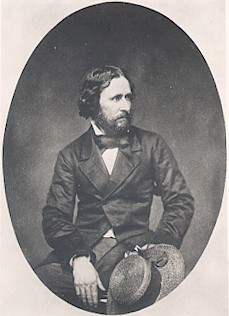Kit Carson
Kit Carson (1809–1868) was an American frontiersman, trapper, soldier, and Indian agent who became a legendary figure in the history of the American West. His life and exploits have been celebrated in numerous books, films, and television shows, making him an iconic figure in American folklore.
Early Life[edit | edit source]
Born in Madison County, Kentucky, Carson moved with his family to Boone's Lick, Missouri, when he was a young child. His father died when Carson was only nine years old, leaving him to help support his family. At age 14, he was apprenticed to a saddler in Franklin, Missouri, but the allure of the West proved too strong, and he ran away to join a merchant caravan headed to Santa Fe, then part of Mexico.
Career[edit | edit source]
Carson's early career was defined by his work as a mountain man and fur trapper. He roamed the Rocky Mountains and the West, living among and often fighting against Native American tribes. His skills as a frontiersman and knowledge of Native languages and culture made him invaluable as a guide and scout during the westward expansion of the United States.
In the 1840s, Carson's life took a turn when he became involved in the military. He served as a guide for John C. Frémont's expeditions, which helped map and open up the trails to the West for settlers. Carson's exploits during these expeditions were widely publicized, contributing to his legendary status.
During the Mexican-American War, Carson served as a courier and scout, famously making a 15-day journey from California to Washington, D.C., to deliver news of the American victory at San Diego. Later, he played a significant role in the conquest of California.
As an Indian agent in the 1850s and 1860s, Carson sought to carry out the government's policy, which often involved relocating Native American tribes to reservations. His role in the forced removal of the Navajo people to Bosque Redondo, a tragic event known as the Long Walk, remains controversial.
Legacy[edit | edit source]
Kit Carson's legacy is complex. While he was celebrated in his time and afterward as a quintessential American hero, modern perspectives have led to a reevaluation of his role in the westward expansion and its impact on Native American peoples. His life embodies the contradictions of American expansionism—heroism and brutality, exploration and conquest.
Death[edit | edit source]
Carson died on May 23, 1868, in Fort Lyon, Colorado. He was buried in Taos, New Mexico, leaving behind a legacy that continues to be debated and interpreted in various ways.
This article is a American West-related stub. You can help WikiMD by expanding it!
Search WikiMD
Ad.Tired of being Overweight? Try W8MD's physician weight loss program.
Semaglutide (Ozempic / Wegovy and Tirzepatide (Mounjaro / Zepbound) available.
Advertise on WikiMD
|
WikiMD's Wellness Encyclopedia |
| Let Food Be Thy Medicine Medicine Thy Food - Hippocrates |
Translate this page: - East Asian
中文,
日本,
한국어,
South Asian
हिन्दी,
தமிழ்,
తెలుగు,
Urdu,
ಕನ್ನಡ,
Southeast Asian
Indonesian,
Vietnamese,
Thai,
မြန်မာဘာသာ,
বাংলা
European
español,
Deutsch,
français,
Greek,
português do Brasil,
polski,
română,
русский,
Nederlands,
norsk,
svenska,
suomi,
Italian
Middle Eastern & African
عربى,
Turkish,
Persian,
Hebrew,
Afrikaans,
isiZulu,
Kiswahili,
Other
Bulgarian,
Hungarian,
Czech,
Swedish,
മലയാളം,
मराठी,
ਪੰਜਾਬੀ,
ગુજરાતી,
Portuguese,
Ukrainian
Medical Disclaimer: WikiMD is not a substitute for professional medical advice. The information on WikiMD is provided as an information resource only, may be incorrect, outdated or misleading, and is not to be used or relied on for any diagnostic or treatment purposes. Please consult your health care provider before making any healthcare decisions or for guidance about a specific medical condition. WikiMD expressly disclaims responsibility, and shall have no liability, for any damages, loss, injury, or liability whatsoever suffered as a result of your reliance on the information contained in this site. By visiting this site you agree to the foregoing terms and conditions, which may from time to time be changed or supplemented by WikiMD. If you do not agree to the foregoing terms and conditions, you should not enter or use this site. See full disclaimer.
Credits:Most images are courtesy of Wikimedia commons, and templates, categories Wikipedia, licensed under CC BY SA or similar.
Contributors: Prab R. Tumpati, MD






